"Is that jersey for real?!"
Turning himself from a super-talented though lazy bike rider to a super-talented, hard working...
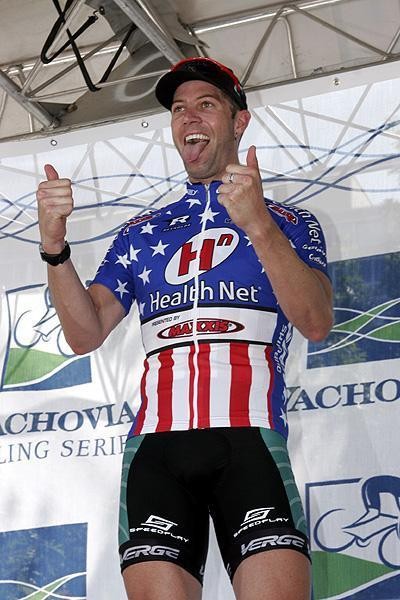
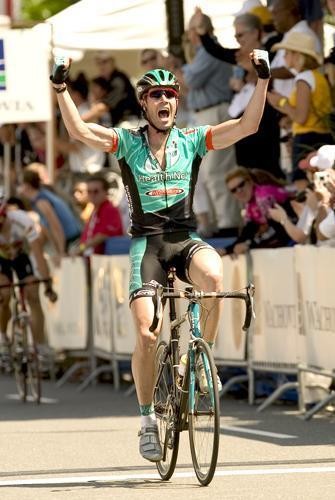
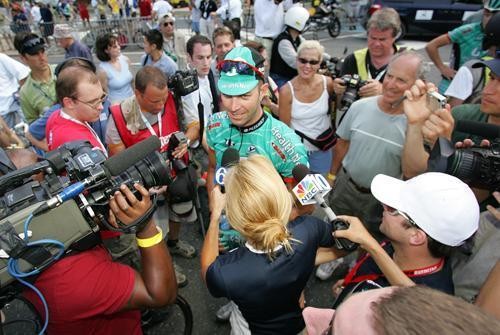
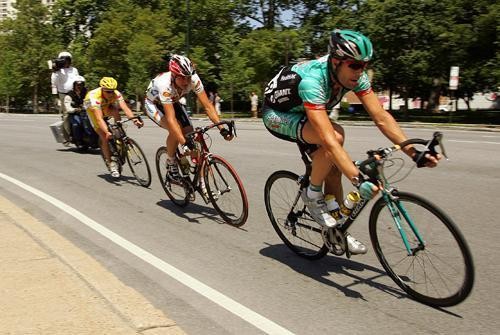
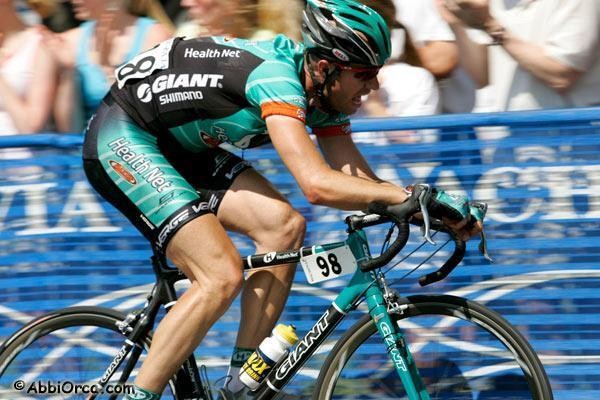
An interview with Chris Wherry, June 22, 2005
"Is that jersey for real?!"
Turning himself from a super-talented though lazy bike rider to a super-talented, hard working professional has been a large part of the 2005 success story that is Chris Wherry. However, it's not just this recently-crowned USPRO champ who's rediscovered his old self - this year, his whole team has been riding on a growing wave of success. Cyclingnews' Rob Karman speaks to the man wearing the stars and stripes.
I lower my camera from my face and observe the interaction between the inquisitive passing rider and the subject I am photographing, recently crowned USPRO Champ, Chris Wherry. The tall, lanky Coloradan simply replies "Yeah" as a big grin spreads across his face. "Cool! I saw it on TV yesterday!" comes the enthusiastic reply as the unknown rider keeps rolling down the road.
And so it has been for Chris Wherry the past week, especially over the weekend as he visits his family in the cycling hotbed of his hometown of Boulder, Colorado. Amid congratulations from numerous friends and acquaintances and even random cycling fans he has never met, Wherry is just taking it all in.
Cyclingnews: So it has been a week, has it sunk in?
Chris Wherry: I'd love to say, 'Yeah it did,' but it hasn't. It has been just so crazy. There are so many cool letters and phone calls and email that it's slowly becoming a reality. I think maybe the first time I get to race in the jersey is going to be when I really feel cool. But that probably won't be until Cascade, I'm going to do the TT National Championships, but that's really the first race I'm going to do.
Get The Leadout Newsletter
The latest race content, interviews, features, reviews and expert buying guides, direct to your inbox!
CN: I have to ask the obvious question, did you sleep in the jersey like you said you would for the next couple of weeks?
CW: I tried it the first night. Then I got too hot so I had to get up and take it off. But it hasn't been far - it's either be sitting in the bedroom next to me or sitting on the couch while I'm checking email. So it's not been out of reach.
CN: You are up in Boulder this weekend, hanging out with your family. Family is pretty important to you. Can you tell us how that has been as a support to you?
CW: Yeah, my family is awesome and they have always supported me through my entire career. They got me into the sport when I was really young. They stuck by me as I continued wanting to do it. They've always been a huge support system for me. My whole family is really close and then when my dad passed away a few years ago that just seemed to bring us even closer together. It makes them even more psyched. They want to see every race they can. After the race my mom was super pissed-off that I didn't let her come out. She's cool now. She said since I didn't let her go out to the race that I would have to come up this weekend and hang out with the family. I thought that was cool.
CN: Now you just mentioned your father passing away. Leading up into that you did pretty well in Philly week that year as well. You were in the selection at the end when your tire went flat the last time down Lemon Hill.
CW: Yeah, it was kind of going soft the last three laps and I was just trying to hang on to it and the very last time we came down the descent off Lemon Hill I just couldn't follow Chann and Danny Pate and Mark Walters because I was washing out in the corner. So, it was super frustrating to know that I had the fitness and that kind of form and not to be able to come through with it. That was pretty rough, but that form carried me through the summer and then I was able to win that big race, the Saturn Cycling Classic, after my dad passed away. I guess I was inspired, but at the same time I had some pretty good form.
CN: So you've proven that you can go from good form first week of June out in Philly and carry it through the summer. Are you making Cascade a goal?
CW: Cascade is a goal for the team. Health Net has a pretty big contingent up in Oregon, the company itself. They always like us to do really well in their home states. You know California was super important to them in the spring and Cascade will be important to the team. I want to ride well and I definitely want to represent the jersey well. Unfortunately I got pretty sick after the race. This last week I had a pretty wicked cold.
I've had that three years in a row now after Philadelphia. I am starting to believe it might be the hotel we stay in. We've nicknamed it the 'Philly SARS Virus'. I could feel it the night after the race so it has been a lot of recovering and trying to keep up with my intense party schedule this week. I'm just hoping I can get back on it. I have taken five or six days almost completely off the bike. But it has treated me well. I did the same thing right after Georgia. And I think rest is one of the biggest things that people misjudge in their seasons. I'm never one to shy from resting.
CN: I know that's really big with your coach, Rick Crawford. You grew up in Boulder and moved down to Durango this past winter part to be closer to where he's at. Can you talk about being more focused? Is it more dedicated rest?
CW: You know Rick is really, really good about monitoring what he calls the 'central nervous system' and he's always trying to keep that as fresh as possible because he knows that when you are firing on all cylinders mentally that physically things will follow. Keeping the mind fresh and the body fresh is one of the biggest things to use to get to your highest potential. He says you can always do such a better workload if you take that one extra day, or take a day of rest and then get back on it hard.
I didn't do really specific training this winter. I wasn't doing this specific threshold interval or this specific VO2 interval - it wasn't like that. It was more a fact that because I was able to move down to Durango, I was able to see Rick almost every day. I'd catch him in the coffee shop or something like that and he'd ask me. It is so great to be in that close contact. Almost every morning I'd be able to talk to him and tell him, 'This is how I feel today. This is how I felt yesterday after the ride. What do you think?' And he could easily say, 'Why don't you go bury yourself for one more day and then take a few more days rest and then start over'. It was really cool for him to be able to be there to do that.
CN: Do you think that is one of the key differences about this year? You had a good season in '02, when you won the Boulder to Breckenridge the last year we had it, and this year you kind of struggled a bit. You've always been close.
CW: You know the last couple seasons... I had a huge season with Mercury that year in '02 and you know it was one of my best seasons ever - I came out of that season not having a contract. Mentally that was really tough for me. I felt I had put in so much time and effort and achieved all these goals by winning all these stage races and winning big one-day races and making final selections at Philly and not to have any reward from it the next year whatsoever. I was fortunate to have had Ed Beamon from Navigators give me a slot on the team, but it was basically like riding for almost nothing and I think that was a huge hit mentally for me and really killed my motivation.
That winter, because I didn't have a contract until the middle of January, I hardly trained, I didn't do the work that needed to get done so then coming off that season, I got sick. I had a parasite that year that I didn't even know about. It was really just an exasperating year all around and then the next season I was just psyched to get back with some of my ex-Mercury teammates with Health Net but I don't know, I think I was still just feeling a bit - I don't know maybe I was just rolling over some bad habits from the year before by not getting out and doing the workload that really needed to get done. There was really a lack of motivation.
To show up the first year with Health Net and have my teammates who are so used to having me around at full strength and at full capacity to see me struggling and to see me not being able to back it up and help those guys out. It was super frustrating for them. I actually spoke to them about that off season - this was just last fall before I went to train in Durango. They were all like, 'This is how we felt this year and we were frustrated with it. You have so much potential and can be a big part of this team. You just need to get back to yourself. We need the old Chris Wherry back.' That slowly made me think I had been slacking. In making that change out of a very, very comfortable living here in Boulder to where I was, in a sense, almost lazy, and to go to Durango and be really motivated. Everything was all fresh and new. All new rides, all new people to train with; just really a whole new town and have the support system that Rick Crawford has down there it is just awesome. It really was like a breath of fresh air so that's really what turned this season around for me.
CN: A little about the old Mercury team - which was a dominant team back in the day. This past two weeks Health Net has been on fire. Lieswyn just pulled it off again yesterday. What is it, five big races in a row?
CW: It is pretty much five big races in a row. We only had a couple riders in the Captech Classic and prior to that we won both the stage races down in Arkansas. If you just keep going back, this team has just been so dominant this year, it's like everything's just clicked.
CN: It sounds like it is a good atmosphere in that people feel comfortable in saying things like, 'Hey it seems like you have been kind of slacking this year.' There is a good rapport among the team. Compare that with Mercury since it's a lot of the same guys. Is this team an even more cohesive unit?
CW: I definitely think it is. Mercury had a core unit of five guys: myself, Henk Vogels, Gord Fraser, Scott Moninger and Mike Sayers. Those five guys were the core for that team and we have all those same guys on the team except for Henk. But we have integrated all these new guys to the team and everybody gets along really well. Everybody's happy and everybody's having a great time with each other. It is like we are just going to race well. As soon as we started popping off wins at the start of the season, everyone on the team just started feeding off that energy and it has snowballed. It is now this giant snowball.
CN: It's not like just two people on the team are winning.
CW: Every single rider on our team has won, now that John Lieswyn won one. He was the last one and it was not for lack of trying, but we have all won major races here now. So it is really incredible. What team can you look at in the recent past where you have that many guys winning - you can't. People compare us to the dominance of Mercury in 2000-01 and yeah I think we are as dominant as that team was, but I think we are even more and we have more depth on our team now. When you have that many guys - every guy on the team has won races - there's no way around it. Everyone's done it.
CN: Do you have a contract with Health Net for next year?
CW: The team itself actually is re-signing the contract with Health Net, so none of the riders have contracts right now. A few of us had two-year deals, but they are up at the end of this year. The company is super psyched with the team and the management is looking to go a little further with the team. There's been a lot of talk about going to division two - I don't know what that's called now - Continental something. But that is a direction the team wants to go. The company is psyched with us so this would be a very hard environment to leave right now - we are just killing it. So it is just like you said, there is so much cohesiveness on this team. Why leave a good thing?
CN: So in talking about the team, are you talking about doing like Navigators does and doing some races overseas... ?
CW: As far as I know there is a lot of talk about the team trying to do some races in Europe - to what extent, I don't know. I don't think they will even know until they finalize things with the team and the contract with Health Net. So I don't foresee us doing quite as much as Navigators does right now. There is so much experience of the riders on our team core - Mike, Scott, and even myself, that know if you go over there firing on all cylinders and go do a month of just hitting it. Do a select couple of races; you know, get in, get some great racing and get out before guys start getting tired and sick. If you are in it for the long haul in Europe, my opinion is that you've got to live over there. If you are going to go do more than a few months of racing at a time you definitely have to have a home base there. We don't have that right now, so I think it is in our best interest to go over there - fly in, kill a couple races and then come home.
CN: Is racing in Europe a personal ambition of yours? Do you see yourself in Europe a couple years down the road if the opportunity came up or are you pretty happy racing here in the States? We have a pretty good racing season. Particularly the way you dominated the last week out on the east coast, you've shown that US teams can be competitive. I think it was Fred Rodriguez that said you guys would be right up there in some of the big European races.
CW: I love racing in Europe. I mean it is the show - big time. I really enjoy being over there. It is super challenging sometimes for me. It is fun to go over there mentally, because I've done Cascade five-six times. I've done Fitchburg. I've done every race we have here in America numerous times. So it is fun to go over there and race on new roads and new races and not know every single turn of every coarse. Granted, for the Classics, you have to know that kind of stuff. That keeps me fresh over there doing races in places I've never been to before. I definitely have aspirations to race over there again. I love doing it, whether I see myself racing full-time over there is yet to be determined. We'll see.